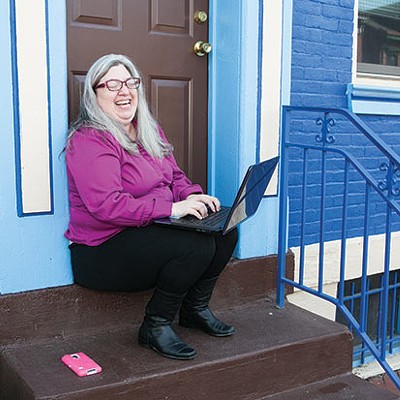Mayor Luke Ravenstahl has declared this Rick Sebak Week, to commemorate the local documentary filmmaker's 25-year-long career. But perhaps the real testament to Sebak is this: After Ravenstahl's announcement, you could hear some local politicos muttering about how this was just an effort to boost the mayor's chances in next year's election. And they weren't entirely kidding.
This is Rick Sebak, after all. The guy whose three-dozen-film franchise — including titles like North Side Story and Things That Aren't Here Anymore — hasn't just defined WQED-TV's program schedule, but helped underwrite it, too. The guy now celebrated in the "Yinztagram" mobile app, which allows you to superimpose a Pittsburgh artifact — the Duquesne Incline, a Primanti Brothers sandwich — on any photo you choose. Sebak's face is one of the most popular add-ons: He's gone from celebrating local landmarks to becoming one. Probably nobody this side of the Pittsburgh Steelers has this kind of popularity: a popularity that transcends generations, political divides and thousands of miles.
And the sensibility of Sebak's films — their love of Pittsburgh's characteristic idiosyncrasies, and idiosyncratic characters — has become part of the city's mindset. Which is something a politician should take seriously. A decade ago, Mayor Tom Murphy provoked an uproar by trying to replace local merchants on Fifth and Forbes avenues with upscale chains. Would there have been such an outcry had Sebak not made 1992's Downtown Pittsburgh, which included a loving portrayal of Fifth Avenue tenant Candy-Rama? Would Pittsburgh have surrendered to big-box dreams of the future, had Sebak not taught us the value of our past? In a way, this is Rick Sebak's town. The mayor just governs it.
So yeah, it might not hurt that Ravenstahl managed to get a photograph of himself seated with Sebak. Unless, of course, the mayor was just using the Yinztagram app, like everyone else.
Still, I'll confess that I was a little wary of Sebak's 25th-anniversary documentary, 25 Things I Like About Pittsburgh, which aired last weekend. After all those films, you start to wonder how much regional charm we have left. I guess we'll know for sure if WQED ever airs They Call It McCandless. But I was worried when 25 Things began celebrating the city's retaining walls. ("We are the city of retaining walls!" Sebak enthuses. "They hold up our hills!")
And there's something almost kind of fetishistic about the way Pittsburgh insists on its quirkiness. Partly that's due to the People Who Aren't Here Anymore: the expatriates who've left during the past 30 years. Every exile carries around an idealized vision of the home he's left behind, and Sebak's films often confirm that vision. Those of us who didn't leave, meanwhile, sometimes seem to believe that there's something distinctly Pittsburgh about behaviors that are, in fact, simple human nature. (Even a man of the world like Allegheny County Executive Rich Fitzgerald seems afflicted. The steel mills may be gone, he says in 25 Things, but "We still love to enjoy ourselves after work" with a good beer. You don't say?)
I sometimes think that if I have to read another feature story about the fries on the sandwiches — or hear someone exclaim about how friendly Pittsburghers are — I'm going to move to Cleveland. I mean, we aren't hobbits: There's more (and sometimes less) to us than a desire for good food and fellowship.
But as 25 Things reminded me, the films themselves are more than nostalgia. Among other things, it features a successful neighborhood anti-violence effort, a neighborhood garden and a slew of neighborhood landmarks often celebrated in City Paper itself.
Perhaps the film's high point comes when Sebak turns up at the Pittsburgh Seltzer Company, where century-old machines inject seltzer water into glass bottles dating back to pre-war Czechoslovakia. Sebak follows those bottles as they are mixed into trendy cocktails at cutting-edge restaurants. The whole segment, really, sums up what Sebak's Pittsburgh is all about: putting new fizz in old bottles.
Because Sebak's films aren't just about a wistfulness for the past. They're also about how Pittsburgh incorporates the past into the present ... something the rest of America generally has a hard time doing. In that way, we truly are distinctive.
Like any good documentarian, Sebak gives the best lines to someone else. Towards the end of 25 Things, he chats with Joe Wos, director of the ToonSeum, who notes how many of Pittsburgh's contributions to culture — like hosting the world's first commercial radio station — reshaped not the palaces of high society, but everyday life.
"There's still that blue-collar ethic that really appreciates that there's nothing common about the common man," Wos says. That's a line that rings true even though (or maybe partly because) we have fewer blue-collar workers than we used to. And it's a line that sums up Sebak's career so far — a career that hasn't just chronicled the trend but been a part of it.
Years from now, I doubt anyone will be waxing nostalgic for Mayor Ravenstahl, or for whoever one day replaces him. But someday, I suspect, people will fondly remember what it was like to remember with Rick Sebak. Which in Pittsburgh may be the greatest honor of all.


















